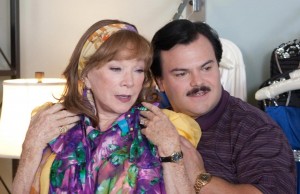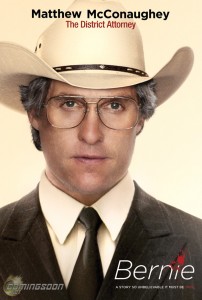 Richard Linklater has directed some of my favorite movies like “Waking Life,” “Before Sunset,” “School of Rock,” and “Dazed and Confused.” He talked to me about his new film, “Bernie,” starring Jack Black as the real-life Bernie Tiede, the most popular man in the small Eastern Texas town of Carthage even after he confessed to killing a wealthy widow and stuffing her in a freezer for nine months. Tiede, now in prison for the murder, was a funeral director who became friendly with octogenarian Marjorie Nugent, known as “the meanest woman in east Texas.” She lavished him with gifts and trips and made him her heir, but then became possessive and demanding and abusive. He shot her, hid the body in her freezer, told everyone she was in assisted living, and spent a lot of her money helping people in the community. Shirley Maclaine plays the widow and the prosecutor is played by Matthew McConaughey. As Ms. Nugent’s nephew wrote in the New York Times:
Richard Linklater has directed some of my favorite movies like “Waking Life,” “Before Sunset,” “School of Rock,” and “Dazed and Confused.” He talked to me about his new film, “Bernie,” starring Jack Black as the real-life Bernie Tiede, the most popular man in the small Eastern Texas town of Carthage even after he confessed to killing a wealthy widow and stuffing her in a freezer for nine months. Tiede, now in prison for the murder, was a funeral director who became friendly with octogenarian Marjorie Nugent, known as “the meanest woman in east Texas.” She lavished him with gifts and trips and made him her heir, but then became possessive and demanding and abusive. He shot her, hid the body in her freezer, told everyone she was in assisted living, and spent a lot of her money helping people in the community. Shirley Maclaine plays the widow and the prosecutor is played by Matthew McConaughey. As Ms. Nugent’s nephew wrote in the New York Times:
There are little things in “Bernie” that aren’t exactly true, bits of dialogue, a changed name here and there. But the big things, the weirdest things, the things you’d assume would have to be made up, happened exactly as the movie says they did. The trial lawyers really did wear Stetsons and cowboy boots and really were named Danny Buck Davidson and Scrappy Holmes. Daddy Sam’s barbecue and bail bonds, just a few blocks from the courthouse in Carthage (population: 6,700), really does have a sign that says, “You Kill It, I’ll Cook It!” And they really did find my Aunt Marge on top of the flounder and under the Marie Callender’s chicken potpies, wrapped in a Lands’ End sheet. They had to wait two days to do the autopsy. It took her that long to thaw.
One of the highlights of this film is the commentary from the people in Carthage. Are those real townspeople really talking about their own experiences?
Oh, they’re definitely, mostly real people, I mean, “non-actors,” but some are actors. Most are people from the area of the state near Carthage and surrounding towns. Some of them were actually intimate with Bernie and Mrs. Nugent, so it’s kind of a mix.
It feels so natural. Was it unscripted?
No, it’s scripted, but they kind of put it in their own words, quite often. I looked at a lot of people and found people that could be themselves, doing material and throwing in. You know, some of my favorite ones were things that people just threw in there. When Sonny Carl Davis, who’s an actor, goes off on the town, “He’s my daddy, he’s my cousin,” you know, he’s got a way with words. And Juli Erickson saying, “Honey, there are people in this town who woulda shot her for five dollars,’ stuff like that.
What made you decide on this quasi-documentary format?
I really never thought of it much as documentary, because the stories were dramatic. I saw a story told from town gossips—and Southern gossip is such a huge thing. I attended the trial, and read and got my hands on everything. I was going through Skip Hollandsworth’s journalistic notes where he had interviewed everybody, and what they were saying was really kind of funny, I felt, and very telling of the town and of the situation. If you think about it, Bernie was in jail, Ms. Nugent was gone, and they’re not there to speak for themselves. As in small towns, with any event like this, all that’s left is the community itself reverberating around with opinions. If you were to go to Carthage, anybody over a certain age would be able to tell you what happened; how they knew Bernie, about the nine months she was in the freezer, how he preached at church, “we hung out, went to a party at his house,” maybe how he should’ve killed her to get away with it—everyone has their own idea, how they would’ve done it? You know, it’s just one of those crazy things. It’s a very rare event, such a notorious crime in that area. The guy says on closing credits, “we don’t have stranger killings, usually it’s family.”
You certainly deglamorized Matthew McConaughey. I love the choice of the glasses, they were wonderful.
Oh, you liked those? Let me think about it, he also had little plumpers in his mouth, and a little gut, an extra 25 pounds. He still had a ways to go to get to the real Danny, but he tried.
And you were at the trial? I never heard of a change of venue to a different city because the defendant was too popular!
Yeah, no one’s ever heard of that. I’ve talked to every judge, DA, defense attorney, since this trial. “Have you ever heard of a trial being moved because it was too because he was too well liked and they didn’t think they could get a conviction, so they had to move to get a jury of his peers?” People just kind of go, “No, I’ve never heard of that.” Skip’s article probably didn’t help Bernie—it just was not on terms that were any good. I think Danny Buck started feeling pretty confident at some point and there wasn’t a plea bargain, or it didn’t work out or something. At the end of the day he definitely got a really hard sentence. Well, the deck was stacked against him. First off, the change of venue, and then the judge disallowed the psychiatrist to examine him, who was going to speak on behalf of his disassociated moment, temporary insanity, and that got disallowed. That was his only hope. As Scrappy tells it, I had a guy who had confessed and told em’ everything and he didn’t have a lot to work with by the time he was with Bernie and yet he was really going for this thing…. The evidence that Danny was allowed to show him at trial, pulling Ms. Nugent out of the freezer, with some really horrific images and out of context. And he successfully prosecutes him as the other— not like us— flying first class, going to the opera.
Tell me about working with Oscar winner and old-style Hollywood movie star Shirley MacLaine.
There’s no one like her. I had always had her in mind for this part, I guess because she had played a Texas grand dame a couple times already, as Aurora in “Terms of Endearment” and the sequel, and I was just lucky she did it. I think she wanted to work with Jack. It’s not a huge part for her, but I think she had fun. It kept her laughing, but she was sort of perfect. What was funny, I think, Shirley liked Ms. Nugent. The first thing she told me was, “even after she’s dead, she’s still around. That’s how I’m going to be! That’s how I’m going to be, you can tell me, that’ll be me.” I think she’s right! There was so much historical record, there was so much testimony. It is a little bit of a dance of how much of a bitch, to what level the bitchiness should reach, but at the end of the day, Ms. Nugent was actually a lot worse than Shirley was in the movie, according to all accounts. Shirley kind of humanized her, but that was my goal. I think the fun part—and this is why I love Shirley for the part—is that she still has that little girl infatuation, she’s still very sensual. When they were first together we called it the honeymoon, the time where she was happy, when out of the blue this terminally miserable lady who could never be happy with anyone or anything, had some fun, a guy paid some attention to her, before she had to possess him and ruin it. There were some happy times there.
I know you’ve worked with him before, but Jack Black would not have been the first person to come to my mind for this part, because Bernie’s a very restrained character, a kind of repressed character—and I think of Jack Black as irrepressible.
Well, that’s what you know from parts you’ve seen him in—but I know him, and having worked with him before, I knew he could do it. I was just lucky he wanted to do the part and found it interesting. And you know, a good actor like Jack, you find there’s a part of Jack that could relate. Bernie is a guy who’s non-confrontational and Jack really is the sweetest guy in the world, a total nice guy. He saw Bernie very clearly, and could in some ways relate to him. And who else could sing like that? There’s really no one else at the end of the day who could play this part, who could sing to Bernie’s actual level.
I love the parts when he sang, when he steps in at that funeral and sings “Amazing Grace,” it was fantastic. What was it like to stage a big musical number from “The Music Man?”
Fun! A dream come true! Anytime, you’re making a musical, it’s just fantastic. I felt like, “I’m Vincente Minnelli, and it’s the fifties and I’m making a musical!”
, made in 1964 but set in the early days of the second World War. It’s the story of a shy fish-loving bookkeeper who turns into a fish and helps the Navy locate German U-Boats. The original trailer is something of an artifact of its own, featuring television personality Arthur Godfrey.


